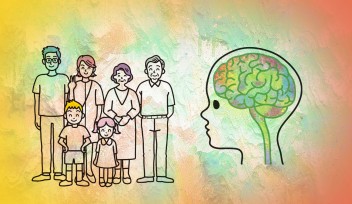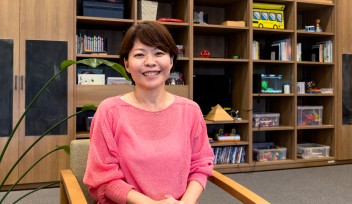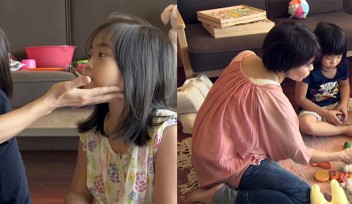Putting community first: “Loving Habits” challenges traditional research paradigms

Each fall, Dr. Emi Furukawa, Group Leader of OIST’s Human Developmental Neurobiology Unit and Children’s Research Center, attends the European Network for Hyperkinetic Disorders’ (EUNETHYDIS) annual meeting, a conference that links a vast network of ADHD researchers, most of whom are based in Europe. Last year, Professor Gail Tripp, head of the unit, presented their experimental findings on how children in Japan, the United States, and New Zealand react to punishment. It spawned a discussion regarding the need to adapt ADHD interventions to diverse cultural characteristics. At one point, a researcher in the audience asked: “Are there interventions that you can export from Japanese culture to the rest of the world?”
It was an unexpected question, but it lingered in Dr. Furukawa’s mind long after the conference had ended. “We couldn’t really think of a good answer when we were asked about that, because a lot of intervention programs for children with ADHD are usually developed in Western cultures, translated, and then imported to Japan,” she says. “We have always been careful about cultural differences when adapting interventions. But there must be positive parenting strategies and values emphasized in Japanese child-rearing that we can share with the world.”
At the time, ‘Loving Habits’, a program that aims to assist families in developing positive behavioral habits, was already under development. As of now, it is engaged in two main research activities: a survey meant to collect insights from a wide range of people affected by ADHD and the development of a mobile health parent support program.
Supported by funding from OIST’s COI-NEXT initiative, which endeavors to achieve a sustainable society anchored in mental, physical, and environmental health, Dr. Furukawa decided to focus on the experiences of Japanese people and incorporate their voices into the Loving Habits program.
“We would like to improve behavioral interventions so that they are more effective for children who demonstrate ADHD tendencies,” she says. “But, in the process of doing so, we want to make sure that we hear the voices of the parents who are raising the children, and the professionals who are supporting them at schools and in other community settings. This will help us propose strategies, based on our experimental findings, that are consistent with what people in the community want.”
Through a fifteen minute survey, Dr. Furukawa collects effective strategies to support neurodivergent children, particularly those affected by ADHD. It asks parents and support professionals to share their interactions with children who exhibit “inattentive, hyperactive, and impulsive behaviors.” Additionally, the survey seeks to garner insight from adults with ADHD and their childhood experiences. These responses are shared anonymously on the Loving Habits survey website for people to freely access.

The research team intends the Loving Habits project to serve as a tool that stakeholders in the community will “actually use” throughout their daily life and the child-rearing process, which requires their direct involvement. “Increasingly, in our field of psychology, we are realizing that when we create interventions based on evaluations in controlled research settings, sometimes they are not the methods that service providers can easily implement or parents and people with ADHD can incorporate into everyday routines,” she says. “There is a greater recognition of needing to get stakeholder input in the process of developing interventions.”
In return, Dr. Furukawa hopes that those who participate in the program’s development will experience a “sense of contribution.”
“The parents and children are used to feeling as if they are receiving something or being helped, but I think they actually have a lot to contribute,” she says. “It allows them to be on a more equal playing field with professionals and contribute to science and other people’s success.”
Loving Habits aims to help minimize the stigma surrounding ADHD and its diagnosis. By creating a forum that shares relevant information with stakeholders in the community, it emboldens individuals to reach out for support. “We try to encourage them to share their experiences, which sends a message saying that ADHD is not something that you need to be ashamed of or hide,” Dr. Furukawa says. “The psychosocial treatment of ADHD is not necessarily trying to change the child but creating an environment where the child can thrive and engage in positive behaviors.”
Dr. Mana Oguchi, a post-doctoral fellow in the unit and the Children’s Research Center who helps coordinate the Loving Habits program, says that one of their primary goals is “building an interactive network” for parents and people with ADHD.
“When we interviewed stakeholders in Okinawa, they mentioned the difficulty they had in forming relationships with other community members,” she says. “In Japan, the knowledge of developmental disorders has been gradually spread to parents, teachers, and support professionals. Ten years ago, they didn’t have such knowledge. Many of the responders to the survey are over thirty, so they have struggled with managing ADHD and not having people to speak with about their experiences. Our program will hopefully make them feel less alone.”
As far as next steps go for the Loving Habits project, Dr. Furukawa and Dr. Oguchi are currently developing a program to share parenting strategies through the mobile messenger app LINE. While there are traditional, in-person training programs available, it can be difficult for some parents to access these support services. With the help of short, animated videos, Loving Habits plans to disseminate positive behavioral approaches across a wider audience and evaluate their effectiveness. Their team met with parents and kindergarten teachers, who had input on the scripts of the videos and voiced the characters. “We want to collaborate and share the creation process, because that will improve the program and be empowering for people in the community,” Dr. Furukawa says.
The team behind Loving Habits ultimately wants the program to grow alongside the community of parents, support professionals, adults with ADHD, and other stakeholders.
“Traditionally, as researchers, we create an intervention, test it, and try to implement it in the community, so it tends to be very static,” Dr. Furukawa says. “But we are realizing that times change, people have new knowledge and strategies, and we have new experimental findings. We want to create an evidence-based support program that continuously develops over time and reflects the changing needs of people in the community.”
The researchers would like Japanese-, English-, and Portuguese-speaking individuals with ADHD, caregivers and support professionals to contribute to the Loving Habits survey.
---
Written by Aytek Abdulla (Intern student)
Specialties
Research Unit
For press enquiries:
Press Inquiry Form














